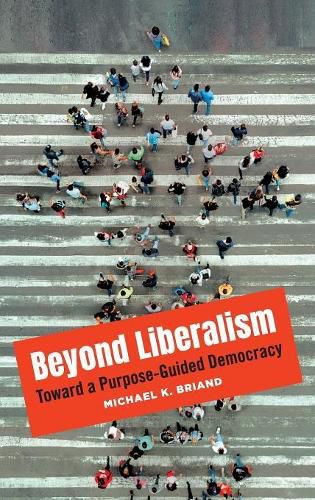Readings Newsletter
Become a Readings Member to make your shopping experience even easier.
Sign in or sign up for free!
You’re not far away from qualifying for FREE standard shipping within Australia
You’ve qualified for FREE standard shipping within Australia
The cart is loading…






This book shows how the United States can begin dealing with the most difficult and intractable political issues that afflict liberal democracy today: by initiating an inclusive public practice of ethical dialogue and deliberation.
Beyond Liberalism argues that there is a flaw in liberalism: the doctrine of individualism. Specifically, the defect consists in two distinct ideas: atomism and subjectivism. These ideas underpin the principle of freedom, which is our default method for making personal choices and resolving interpersonal disagreements but contains no standard for determining what might be worth doing, and hence no criteria for assigning relative priority to values in conflict.
Objective ethical judgments can be achieved, however, if we understand that, insofar as they support the fulfillment of empirically identified human needs, statements about good and bad are propositions of a factual nature. A conception of the good for human beings is implicit in the fulfillment of those needs. To articulate that conception, we need a constructive, productive public practice of ethical dialogue and deliberation. To build such a practice will require what amounts to a life of ethical heroism. This book seeks to encourage that sort of life.
Explains that the fundamental problem with liberalism today is its flawed conception of individualism, which discourages people from thinking ethically when forming our political beliefs and policy preferences
Contends that beliefs about good and bad, right and wrong can be objective if understood as propositions of a factual nature, and that a conception of the good for human beings is implicit in the fulfillment of empirically identified human needs
Asserts that people can begin dealing effectively with the most difficult and intractable political issues that afflict liberal democracy today by initiating a constructive, productive public practice of ethical dialogue and deliberation
Issues a call for ethical heroism to build such a practice in order to begin reversing the dispiriting effects of contemporary liberalism and its faulty conception of individualism
$9.00 standard shipping within Australia
FREE standard shipping within Australia for orders over $100.00
Express & International shipping calculated at checkout
This book shows how the United States can begin dealing with the most difficult and intractable political issues that afflict liberal democracy today: by initiating an inclusive public practice of ethical dialogue and deliberation.
Beyond Liberalism argues that there is a flaw in liberalism: the doctrine of individualism. Specifically, the defect consists in two distinct ideas: atomism and subjectivism. These ideas underpin the principle of freedom, which is our default method for making personal choices and resolving interpersonal disagreements but contains no standard for determining what might be worth doing, and hence no criteria for assigning relative priority to values in conflict.
Objective ethical judgments can be achieved, however, if we understand that, insofar as they support the fulfillment of empirically identified human needs, statements about good and bad are propositions of a factual nature. A conception of the good for human beings is implicit in the fulfillment of those needs. To articulate that conception, we need a constructive, productive public practice of ethical dialogue and deliberation. To build such a practice will require what amounts to a life of ethical heroism. This book seeks to encourage that sort of life.
Explains that the fundamental problem with liberalism today is its flawed conception of individualism, which discourages people from thinking ethically when forming our political beliefs and policy preferences
Contends that beliefs about good and bad, right and wrong can be objective if understood as propositions of a factual nature, and that a conception of the good for human beings is implicit in the fulfillment of empirically identified human needs
Asserts that people can begin dealing effectively with the most difficult and intractable political issues that afflict liberal democracy today by initiating a constructive, productive public practice of ethical dialogue and deliberation
Issues a call for ethical heroism to build such a practice in order to begin reversing the dispiriting effects of contemporary liberalism and its faulty conception of individualism